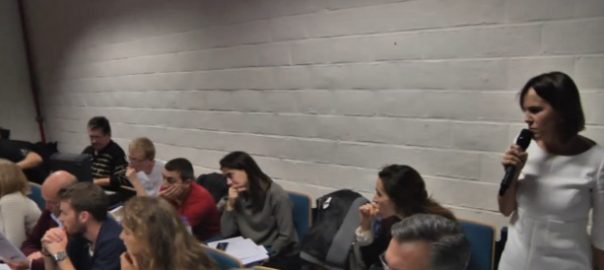20.10.2016 - 15:40
|
Actualització: 20.10.2016 - 17:40
The conference ‘Catalonia: A New State in Europe?’ organised this Tuesday by the Public Diplomacy Council of Catalonia (DIPLOCAT) and the ‘Institut de Ciénces Politiques Louvain-Europe’ (ISPOLE) at the Catholic University of Louvain (UCL) was secretly attended by an employee of the Spanish Embassy in Belgium. Laura Martínez Bocos, who claimed to represent Spaniards and ‘the 52% of Catalans who don’t support Catalonia’s independence’, questioned the data presented during the event. However, soon afterwards, Martínez Bocos admitted to speaking on behalf of the Spanish Embassy in Belgium, where she holds the rank of Counsellor. ‘I don’t know how you normally do diplomacy in Spain, but this is not a very diplomatic way to do things’, Associate Professor at the UCL, Vincent Laborderie, told her and took away her right to speak.
Martínez Bocos assured at the outset that she was ‘a PhD student’, then later a ‘Spaniard’ and finally a ‘Spanish diplomat’, and said that she didn’t consider the event ‘academic’. ‘I’m sorry but I don’t find this debate academic at all, because for it to be academic as those which should be held at the UCL, they have to have a certain position and an opposition’, she said.
The Spanish diplomat assured those present that she was talking ‘on behalf of the 52% of Catalans who don’t support Catalonia’s independence’ and accused the Representative of the Catalan Government to the EU, Amadeu Altafaj, of lying and providing false data about pro-independence support in Catalonia in favour of calling a referendum. ‘I didn’t have the same time as Mr. Atafaj to expound my criteria’, she claimed. ‘It’s enough, you have been talking for 15 minutes now’, stated moderator Vincent Laborderie and invited her to hold a debate on Spain on other occasion, which she declined.
Challenges and opportunities that Scotland and Catalonia present to the EU
The conference included the presence of Altafaj, as well Bruno Coppieters, Head of the Political Science Department at the Free University of Brussels (VUB), Michael Keating, Professor of Political Science at the University of Aberdeen and Director of the ESRC Centre on Constitutional Change and Esther Zapater, Professor of Public International Law and International Relations, and Dean of the Law School at the Autonomous University of Barcelona. Michel Liégeois, President of ISPOLE, and Martí Estruch, Communications Director at Diplocat, welcomed the attendees who filled the room on behalf of the organisers. The roundtable, moderated by Vincent Laborderie, Associate Professor at the UCL, allowed various professors from European universities to discuss the challenges and opportunities that are presented to Europe by the Scottish and Catalan cases.
Altafaj lamented the lack of dialogue between Catalonia and the Spanish Government, and pointed to the recent conference given by Catalan President, Carles Puigdemont in Madrid, which was attended by a dozen ambassadors, but not a single representative of the Spanish Government. The representative of the Catalan Government to the EU also criticised the Spanish Government’s use of the legal system as ‘the armed wing of the Executive Branch of the Spanish Government’ with the Spanish Constitution as ‘their weapon’. He made it clear that ‘Catalonia does not want to build walls, but rather seeks to carry out the mandate given to the Government by Catalonia’s citizens at the ballot box.’
Head of the Political Science Department at the Free University of Brussels (VUB),Bruno Coppieters, posited that the easiest solution to the Catalan case ‘would be to ask them what they want, but that isn’t possible’. ‘It is very possible that Catalonia will end up declaring independence, but international recognition is quite another thing, because that depends directly on Spain and the EU will not do it if Spain doesn’t’, he stated.
Michael Keating, Professor of Political Science at the University of Aberdeen and Director of the ESRC Centre on Constitutional Change spoke about Scotland and the new scenario there following Brexit. He said that the current situation ‘is very complex, with problems of democratic legitimacy, of opportunity, and constitutional as well as economic issues.’ The fact that a ‘hard Brexit’ now appears to have overtaken the ‘soft Brexit’ approach complicates things even more, for both Scotland as well as Northern Ireland, where there is intensive internal discussion, according to Keating.
Esther Zapater, Professor of Public International Law and International Relations and Dean of the Law School at the Autonomous University of Barcelona, talked about the legal approach to the Catalan case, mentioning the conflict between legality and legitimacy. ‘The problem is that in Spain the unionists have a very closed reading of the Constitution, and they don’t accept any other option than refusing a referendum’, she said. Zapater also assured that ‘at some point the EU will need to take a stance, and it is probable that the EU will be pragmatic in their approach.
UCL and ISPOLE
The Universtié Catholique de Louvain (UCL) is Belgium’s largest French-speaking university. UCL has satellite campuses in Brussels, Charleroi, Mons and Tournai. In 1968 the Catholic University of Leuven split into the Dutch-language Katholieke Universiteit Leuven, which stayed in Leuven, and the French-language Université Catholique de Louvain, which moved to Louvain-la-Neuve in Wallonia, which was purposely built to house the university.
The Institut de Sciences Politiques Louvain-Europe ISPOLE brings together researchers working on policy issues, from the Belgian, European and international points of view, and in a multidisciplinary perspective encompassing different fields. Located in Mons and Louvain, the Institute has sixty-four employees (59 researchers in four research centres and 5 administrative staff).


